Publications
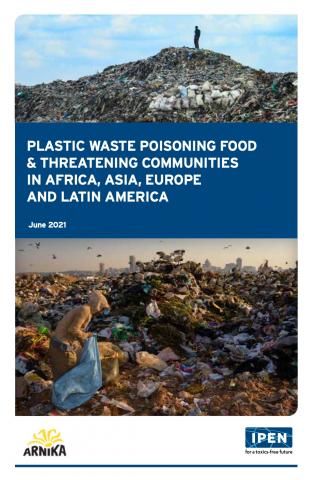
Toxic Chemicals in Plastic Waste Poisoning People in Africa, Asia, Central and Eastern Europe & Latin America.
IPEN & Arnika, June 2021
Plastics and food packaging contain chemical contaminants from manufacturing along with many additives to make them inflammable, more flexible, grease-resistant, or sterile, as well as other substances to create many other properties. Many of these additives are toxic and they leak from products during use and can be released during recycling and from recycled products.
This study focuses on persistent organic pollutants (POPs), whose releases are closely related to plastic wastes. The POPs include additives in the plastic as such, as well as unintentionally produced POPs (UPOPs) generated mostly by burning, incineration and/or other thermal treatment of plastics.
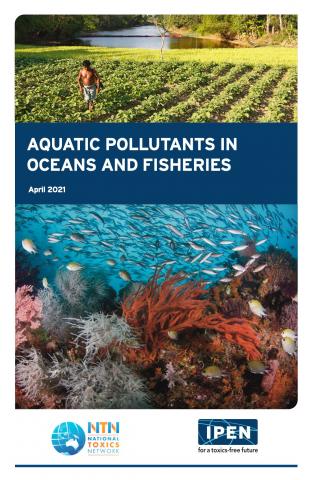
Aquatic Pollutants in Oceans and Fisheries
IPEN & NTN | April 2021
Chemicals are polluting oceans and waterways, not only endangering wildlife and those who rely on seafood for sustenance, but threatening the collapse of many fisheries. In combination with global warming, this is a catastrophe in the making. This report is the first to begin to detail the numerous ways and places in which chemical pollution and climate change is destabilizing this marine infrastructure and the world's fisheries. We still have time to stop the destruction, but as this report indicates, we will need to go beyond thinking only about how to control overfishing or manage pollutants in the fish we consume. Our survival, along with that of all other species, will depend on ensuring the health of the entire ocean, an objective we all must work on together to achieve.
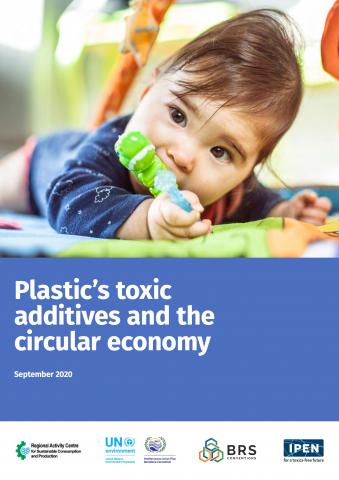
Plastic's Toxic Additives and the Circular Economy
IPEN | September 2020
Toxic chemicals of concern that are widespread in common plastic products can hinder the momentum for a circular economy. A new report, coordinated by the Barcelona-based(1) Regional Activity Centre for Sustainable Consumption and Production (SCP/RAC), serving both the Stockholm Convention and the Barcelona Convention, has been produced in collaboration with the International Pollutants Elimination Network (IPEN) in order to shine a light on extensive evidence of toxic chemical components in plastics that can harm human and environmental health and impede a safe circular economy.
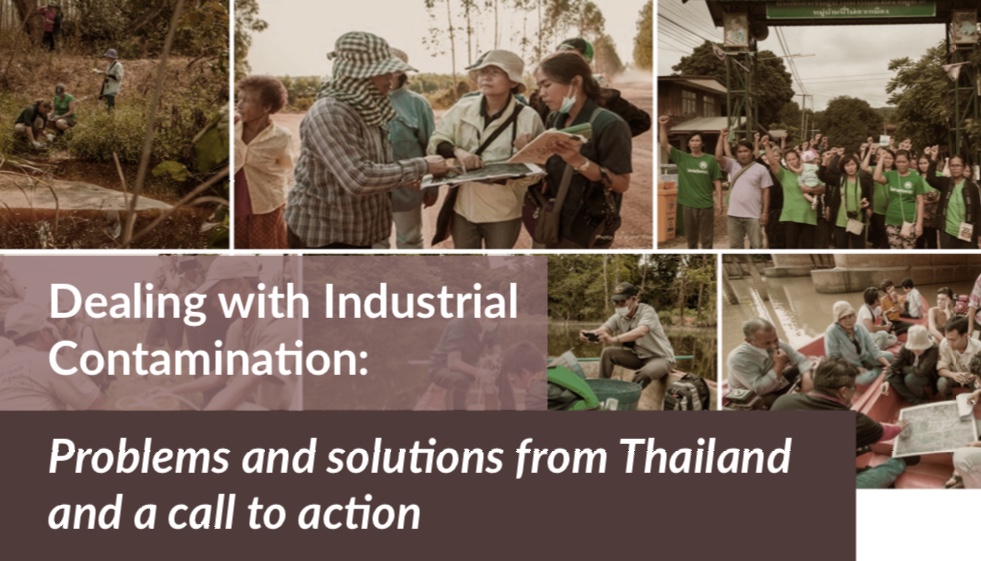
Dealing with Industrial Contamination: Problems and solutions from Thailand and a call to action
March 2020
The condition of Thailand's natural and social environment entered a crisis in 1990s, which resulted in major amendments to national laws concerning environment and pollution control in 1992.

Call for a global ban policy on and scientific management of asbestos to eliminate asbestos-related diseases
Journal of Public Health Policy, March 2020 | Achyut Aryal and Craig Morley
Asbestos is a primary cause of cancer worldwide. Global estimates indicate workplace exposure of 125 million people and about 255,000 deaths each year. Of the approximately 300 million metric tonnes of asbestos ever produced worldwide, most will become waste and disposed of in landfills. The recycling and transforming asbestos fibre into a non-harmful product offer a sustainable solution, but a global commitment remains elusive. Urgent action is needed.
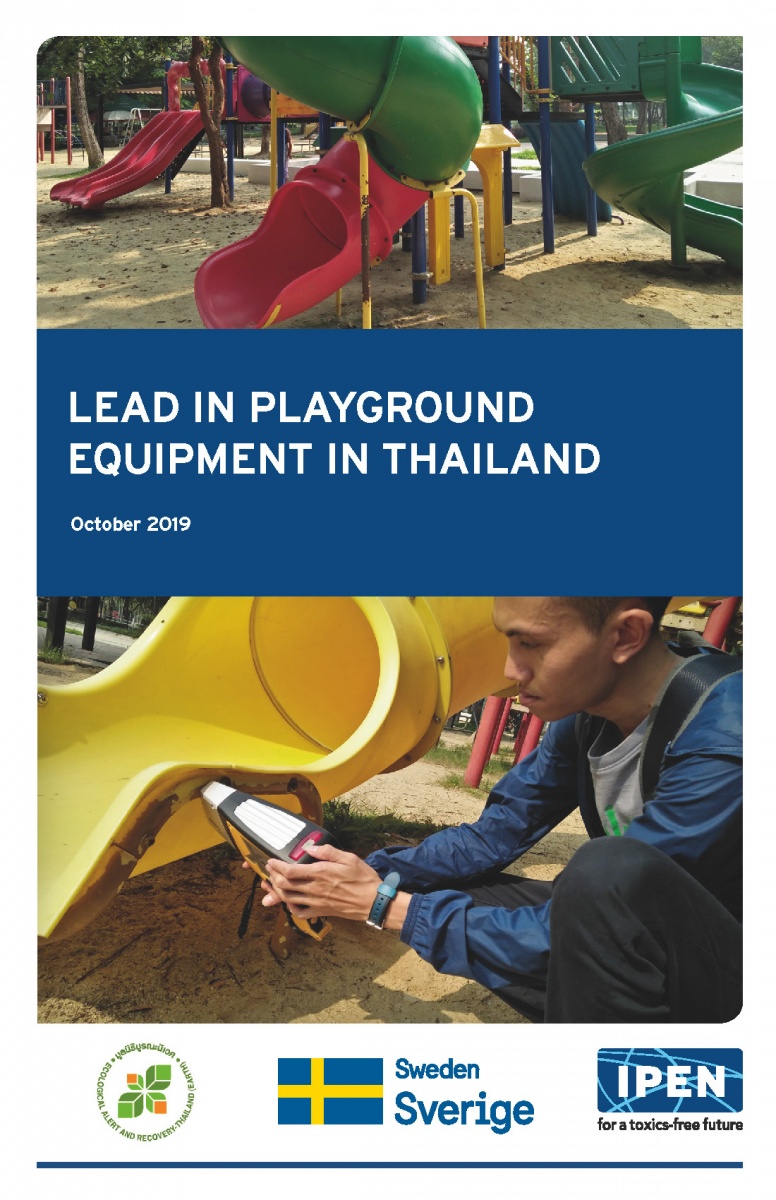
Lead in Playground Equipment in Thailand
IPEN & EARTH, October 2019
On 30 September 2019, EARTH visited Benjakitti Park and Lumphini Park located in Bangkok City, Thailand, and screened the playground equipment for lead content. In each playground, painted play equipment and the condition of painted surface were documented. This study shows that 20 out of 24 analyzed pieces of playground equipment contained total lead concentrations above 90 parts per million (ppm), dry weight. In addition, 14 analyzed pieces of playground equipment contained dangerously high lead levels above 10,000 ppm.; 15 out of 16 bright-colored painted surfaces contained lead concentrations above 90 ppm, dry weight; and the highest lead concentration detected was 72,300 ppm in a red monkey bar at a public playground in Benjakitti Park, Bangkok.
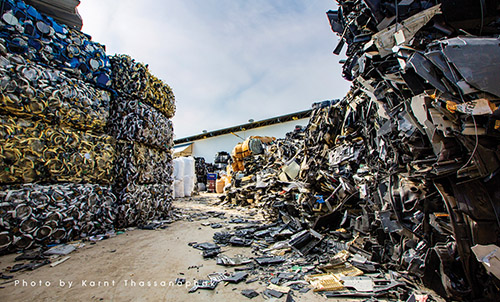
Trading Away Health and the Environment: The Toxic Business of Waste Imports into Thailand
Co-Authors: Tanya Lee Roberts-Davis & Penchom Saetang
Ecological Alert and Recovery - Thailand (EARTH) | June 2019
Trading Away Health and the Environment provides an overview of the devastating impacts on the health and well-being of communities in Thailand where industrial waste processing facilities are being developed as part of an ongoing expansion of the transnational business of plastic and used electronics waste and scraps.
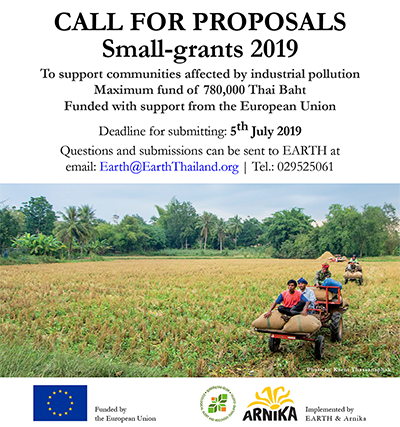
Call for Proposals to support communities affected by industrial pollution
Jointly implemented by: EARTH (Thailand) and Arnika Association (Czechia) under the project: “Public participation through citizen science and EIA system enhancement” (Funded with support from the European Union)
Deadline for submitting: 5th July 2019
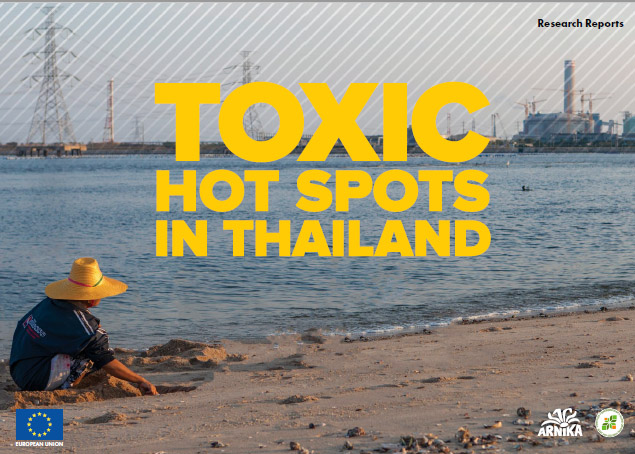
Toxic Hot Spots in Thailand
Authors: Jindřich Petrlík, Alice Dvorská, Václav Mach, Marek Šír, Jitka Straková, Akarapon Teebthaisong, Jana Tremlová, Peter A. Behnisch, Martin Bystrianský, Autthaporn Ritthichat, Penchom Saetang
By Arnika Association and Ecological Alert and Recovery - Thailand (EARTH) | December 2018
The data presented in the studies were obtained during sampling campaigns in Thailand in February 2015, February and March 2016, and February 2017. The sampling campaigns represent an important part of the project “Increasing Transparency in Industrial Pollution Management through Citizen Science.”
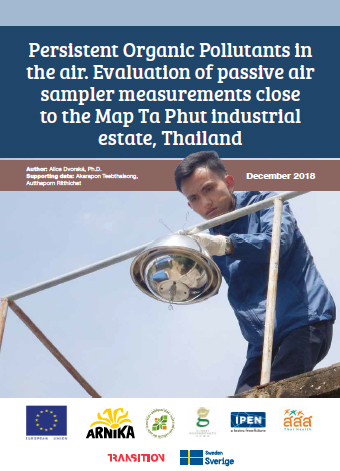
Evaluation of passive air sampler measurements close to the Map Ta Phut industrial estate, Thailand
Author: Alice Dvorská, Ph.D., | December 2018
Passive samplers are chemical accumulators that can be used to assess ambient concentrations in either homogeneous or heterogeneous media into which they are deployed. They are increasingly employed in investigations of persistent organic pollutants (POPs) (Shoeib and Harner, 2002). There are various PAS sampling media and designs used. In contrast to high-cost active air samplers, passive air samplers (PAS) do not require pumps, sampling heads and a source of electricity. They are inexpensive and small and therefore increasingly used for POPs monitoring and spatial studies at local, regional and continental scales (Pozo et al., 2009 and references therein).


